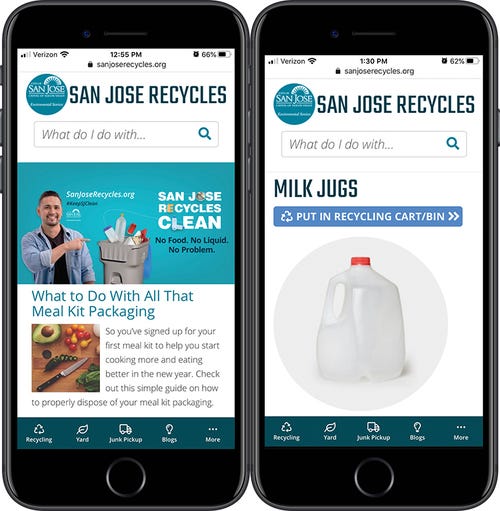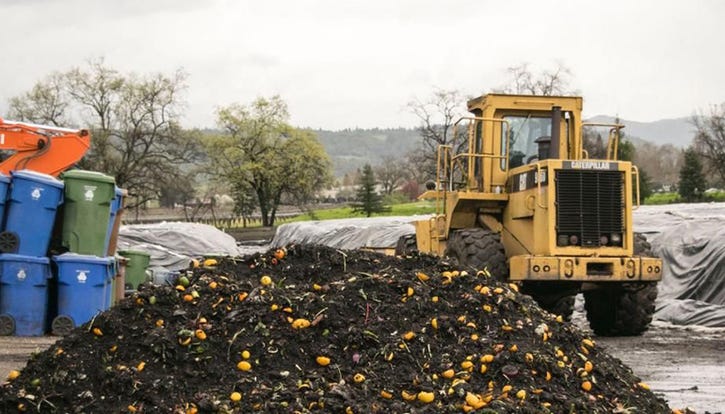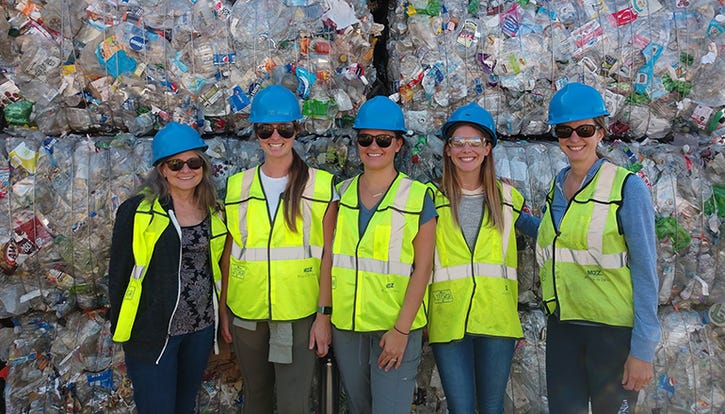Women Leaders in Waste: Emily Coven of Recyclist
Coven is using the power of technology and education to enhance the recycling industry.

It’s no secret that recycling systems vary from location to location—adding to consumers’ confusion at the bin—and it’s not always the simplest of tasks to find information on what can and cannot be recycled in a specific area. Frustrated by this issue, Emily Coven decided to put her media technology experience to better use by conceiving Recyclist, a company that creates cloud-based services for solid waste program management and provides easy-to-understand information about recycling.
“Recyclist really developed out of an idea I had to provide clean, clear and concise educational information on recycling,” says Coven. “When I tried to search online for information, I kept hitting dead ends, but after speaking to people in communities near me, I realized there was a need for a platform like Recyclist.”
“I guess you could say I ended up [in the industry] by a happy accident since I was just a typical resident wanting to recycle better, but the difference is I decided to do something about [the void I saw in the industry] and am now part of the wonderful world of waste,” she adds.
When Coven launched Recyclist in 2015, she didn’t set out to start a data management company. Recyclist began with a basic database that provided information on how commercial and multifamily “generators” are diverting organics. And while that’s still a key part of the company, Recyclist has continuously welcomed ideas from customers and shifted its thought process to develop more products that meet customers’ needs.

One example is the leading product at Recyclist, the Program Tracker, which started out as a side project exploring how an online database to track California’s Mandatory Commercial Organics Recycling law (AB 1826) could work. The database worked well enough to capture the attention of other cities and eventually evolved into a full-featured data management platform that any jurisdiction can use to track what its commercial and multifamily generators are doing with all streams of waste.
Recyclist also recently implemented the Entrepreneurial Operating System, which Coven highly recommends to growing companies; created valuable public education products that help support additional interest sparked by National Sword; and developed extensive customer relationship management features for scheduling and logging outreach and generating service estimates, waste audits and assessments.
“Now, in California, the conversation is all about organics and the new Short-Lived Climate Pollutants legislation (SB 1383). For Recyclist, this presents an amazing opportunity to expand our Program Tracker to encompass all of the extensive, new recordkeeping and reporting requirements of the regulations,” says Coven. “We’ve already rolled out several SB 1383 features, but there are many more to go. One of the things we’re looking forward to the most in 2020 is collaborating with our now sizable customer base to ensure that we build out the full suite of SB 1383 tools in a way that will make it as easy as possible for everyone to comply.”

These product launches and upgrades go hand in hand with the company’s short- and long-term goals. Short term, Recyclist is focusing on improving internal processes, providing even better customer service, continuing to receive high satisfaction from employees and maintaining a “stellar reputation in the industry.” Long term, the company aims to significantly expand its footprint in California and into other regions—growing for the sake of greater impact.
“We’re really in a growth phase right now and building on some of the accomplishments we’ve reached,” comments Coven. “For instance, on the public education side, we recently delivered our one millionth page of recycling information to the public. And on the data side, we’ve seen more and more customers divert recycling and organics as a result of efforts facilitated by our software. All of those small changes add up to a big impact, and it’s exciting to be a part of it.”
These accomplishments are a result of Recyclist’s team members and customers, who, along with Coven’s two sons, motivate her to come into work each day. She says everyone at the company is driven by the company’s mission to achieve effective and positive environmental change and that staff sets and tracks goals together to ensure the best possible outcomes.
“Starting and growing a business is very challenging, and I’ve realized over the years there is no goal line,” explains Coven. “Once you cross the goal line and get a touchdown, a new goal is in front of you. You’re always 50 yards out, which makes our jobs both challenging and interesting.”

In addition to her staff and family, Coven is inspired by other women in the waste and recycling industry, many of whom are Recyclist’s earliest supporters—Gretchen Olsen, then with the city of Stockton, Calif.; Mandy Brooks, Salinas Valley Recycles; Patti Toews, San Luis Obispo County, Calif., Integrated Waste Management Authority; and Tracie Bills, SCS Engineers. According to Coven, these women were willing to take a chance on a new startup and see her as a competent professional with worthwhile ideas.
To further bring women in the industry together, Coven met with Rachel Oster and Erin Merrill of Women in Solid Waste & Recycling (WISR) and attended the group’s first-ever event. From there, she launched Tahoe Women in Waste meetups, where local industry women come together to have fun and support each other.
“What I love about the waste and recycling industry is that it’s the perfect industry for people with diverse interests. It’s so fascinating to me how this one industry—which touches the lives of every single person on the planet, every single day—exists at the intersection of so many disciplines: engineering, technology, finance, government, human behavior, communications, logistics, etc.,” states Coven.
“In terms of finding your career path in the industry, I loved something Daniel Silverstein said in a keynote at the California Resource Recovery Association conference a few years ago. He encouraged everyone to figure out what they are best at and then focus their energies on that,” she adds. “Waste is such a huge, complex problem that we need everyone to put their best foot forward. So, if you enter the industry and feel like your first job is not you, keep seeking the right fit. It’s amazing what we can accomplish if we’re all doing the jobs we’re meant for.”
As we continue this series, we invite our readers to email Waste360 Editorial Director Mallory Szczepanski at [email protected] with suggestions of women to feature in the coming months.
About the Author(s)
You May Also Like




